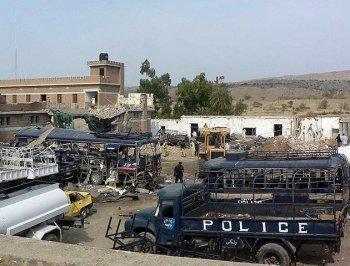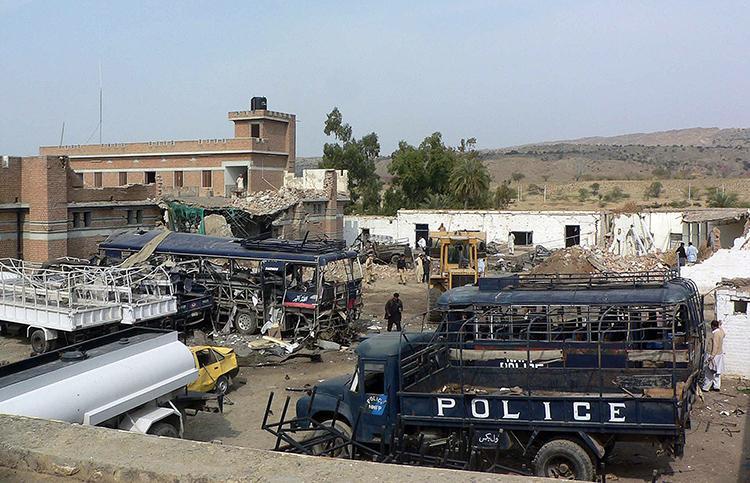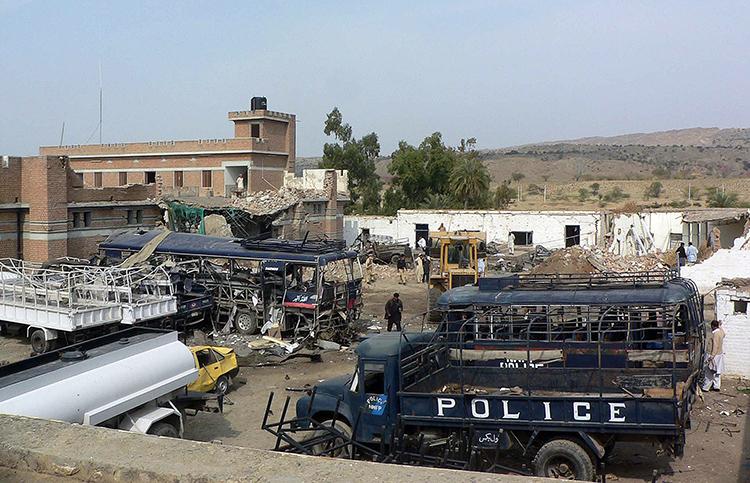With just over three years remaining for operations in Afghanistan, coalition forces are switching their sights to terrorist cells operating in Pakistan.
President Barack Obama announced the 2010 Afghanistan-Pakistan Annual Review on Dec. 16. The review shows the status of the U.S. strategy in Afghanistan, and progress of operations. It is based on data collected from the ground, beginning on Oct. 12, as well as on meetings with partners in Afghanistan, Pakistan, and the coalition.
Obama reiterated the reason for the war in Afghanistan, saying it was where Al-Qaida plotted the 9/11 attacks. “It is the tribal regions along the Afghan-Pakistan border from which terrorists have launched more attacks against our homeland and our allies,” Obama said, according to a White House transcript. “And if an even wider insurgency were to engulf Afghanistan, that would give al Qaeda even more space to plan these attacks.”
He said the goal is “not to defeat every last threat to the security of Afghanistan,” and is “not nation-building,” as both tasks will be left to the Afghan people. “Rather, we are focused on disrupting, dismantling and defeating al Qaeda in Afghanistan and Pakistan, and preventing its capacity to threaten America and our allies in the future.”
Coalition operations targeting leaders of the Taliban and Al-Qaeda have placed the militant groups under heavy pressure.
The International Security Assistance Force (ISAF) frequently releases reports of the killing or capture of insurgent leaders. The most recent was the confirmed death of targeted Taliban leader, Hamas, on Dec. 20.
Another Taliban leader, Tora Bora Brigade commander Ibn Amin, was killed on Dec. 17 by a U.S. Predator unmanned aircraft strike, in Tirah Valley in the Khyber tribal agency. Amin was among 60 Taliban and Lashkar-e-Islam commanders and fighters killed in four air strikes on Dec. 17 and Dec. 16, according to a report from the Long War Journal, a project of non-partisan policy institute, the Foundation for Defense of Democracies (FDD).
While pressure is mounting on the Taliban in Afghanistan, Pakistan remains a stronghold for insurgent groups.
The Taliban claimed responsibility for coordinated suicide attacks against army recruitment centers in Kabul and Kunduz, killing 13 Afghan security personnel, according to a Dec. 19 report from the Long War Journal.
Pakistan-based militant groups are suspected to be connected to both attacks. “The attack in Kabul was likely carried out by the Kabul Attack Network,” which top Afghan intelligence officials have linked to Pakistan’s Inter-Services Intelligence directorate, according to the report.
The Kunduz attack is believed to have been carried out by the Taliban and the Islamic Movement of Uzbekistan “which is an al Qaeda affiliate that is based in Pakistan and operates in northern Afghanistan,” stated the report.
The Afghanistan and Pakistan Annual Review stated that “with regard to al-Qa’ida’s Pakistan-based leadership and cadre,” the U.S. must move towards its “ultimate end state” of the “strategic defeat of al-Qa’ida in the region.” A key focus should be denying a safe haven for Al-Qaeda in Pakistan’s western tribal areas.
Meanwhile, the U.S. will work on establishing better relations with the Pakistani government. The current strategy for Pakistan will “require adjustment,” the review stated. This will include better cooperation with the Pakistani government in securing the border with Afghanistan.
The United States and Pakistan have had a rocky relationship, yet both are aware of the need to cooperate. U.S. financial support to Pakistan is largely preventing the Pakistani government from crumbling, while Pakistan plays an important role in the Afghan war through its supply routes and its own operations against Taliban and Al-Qaeda forces.
The Pakistani government has protested U.S. and coalition operations on Pakistan soil in the past. They cut off the supply line at the Pakistan-Afghanistan border at Torkham after two U.S. helicopters shot and killed Pakistani frontier scouts along the border in September. The supply line wasn’t reopened until Oct. 9, after U.S. Ambassador Anne Patterson made a public apology three days earlier.
Pakistan also provides sanctuary for several militant groups. The Haqqani Network, in particular, has safe haven in North Waziristan.
During his Dec. 16 speech, Obama said “Increasingly, the Pakistani government recognizes that terrorist networks in its border regions are a threat to all our countries, especially Pakistan ... we will continue to insist to Pakistani leaders that terrorist safe havens within their borders must be dealt with.”
What Pakistan wants from the U.S. is more financial support, particularly after the July floods left the region in shambles. Meanwhile, the U.S. wants more military support from Pakistan within its own borders.
It seems both of these requests are being met. Obama said in his speech “we need to support the economic and political development that is critical to Pakistan’s future ... We’ll speed up our investment in civilian institutions and projects that improve the lives of Pakistanis.”
President Barack Obama announced the 2010 Afghanistan-Pakistan Annual Review on Dec. 16. The review shows the status of the U.S. strategy in Afghanistan, and progress of operations. It is based on data collected from the ground, beginning on Oct. 12, as well as on meetings with partners in Afghanistan, Pakistan, and the coalition.
Obama reiterated the reason for the war in Afghanistan, saying it was where Al-Qaida plotted the 9/11 attacks. “It is the tribal regions along the Afghan-Pakistan border from which terrorists have launched more attacks against our homeland and our allies,” Obama said, according to a White House transcript. “And if an even wider insurgency were to engulf Afghanistan, that would give al Qaeda even more space to plan these attacks.”
He said the goal is “not to defeat every last threat to the security of Afghanistan,” and is “not nation-building,” as both tasks will be left to the Afghan people. “Rather, we are focused on disrupting, dismantling and defeating al Qaeda in Afghanistan and Pakistan, and preventing its capacity to threaten America and our allies in the future.”
Coalition operations targeting leaders of the Taliban and Al-Qaeda have placed the militant groups under heavy pressure.
The International Security Assistance Force (ISAF) frequently releases reports of the killing or capture of insurgent leaders. The most recent was the confirmed death of targeted Taliban leader, Hamas, on Dec. 20.
Another Taliban leader, Tora Bora Brigade commander Ibn Amin, was killed on Dec. 17 by a U.S. Predator unmanned aircraft strike, in Tirah Valley in the Khyber tribal agency. Amin was among 60 Taliban and Lashkar-e-Islam commanders and fighters killed in four air strikes on Dec. 17 and Dec. 16, according to a report from the Long War Journal, a project of non-partisan policy institute, the Foundation for Defense of Democracies (FDD).
While pressure is mounting on the Taliban in Afghanistan, Pakistan remains a stronghold for insurgent groups.
The Taliban claimed responsibility for coordinated suicide attacks against army recruitment centers in Kabul and Kunduz, killing 13 Afghan security personnel, according to a Dec. 19 report from the Long War Journal.
Pakistan-based militant groups are suspected to be connected to both attacks. “The attack in Kabul was likely carried out by the Kabul Attack Network,” which top Afghan intelligence officials have linked to Pakistan’s Inter-Services Intelligence directorate, according to the report.
The Kunduz attack is believed to have been carried out by the Taliban and the Islamic Movement of Uzbekistan “which is an al Qaeda affiliate that is based in Pakistan and operates in northern Afghanistan,” stated the report.
The Afghanistan and Pakistan Annual Review stated that “with regard to al-Qa’ida’s Pakistan-based leadership and cadre,” the U.S. must move towards its “ultimate end state” of the “strategic defeat of al-Qa’ida in the region.” A key focus should be denying a safe haven for Al-Qaeda in Pakistan’s western tribal areas.
Meanwhile, the U.S. will work on establishing better relations with the Pakistani government. The current strategy for Pakistan will “require adjustment,” the review stated. This will include better cooperation with the Pakistani government in securing the border with Afghanistan.
The United States and Pakistan have had a rocky relationship, yet both are aware of the need to cooperate. U.S. financial support to Pakistan is largely preventing the Pakistani government from crumbling, while Pakistan plays an important role in the Afghan war through its supply routes and its own operations against Taliban and Al-Qaeda forces.
The Pakistani government has protested U.S. and coalition operations on Pakistan soil in the past. They cut off the supply line at the Pakistan-Afghanistan border at Torkham after two U.S. helicopters shot and killed Pakistani frontier scouts along the border in September. The supply line wasn’t reopened until Oct. 9, after U.S. Ambassador Anne Patterson made a public apology three days earlier.
Pakistan also provides sanctuary for several militant groups. The Haqqani Network, in particular, has safe haven in North Waziristan.
During his Dec. 16 speech, Obama said “Increasingly, the Pakistani government recognizes that terrorist networks in its border regions are a threat to all our countries, especially Pakistan ... we will continue to insist to Pakistani leaders that terrorist safe havens within their borders must be dealt with.”
What Pakistan wants from the U.S. is more financial support, particularly after the July floods left the region in shambles. Meanwhile, the U.S. wants more military support from Pakistan within its own borders.
It seems both of these requests are being met. Obama said in his speech “we need to support the economic and political development that is critical to Pakistan’s future ... We’ll speed up our investment in civilian institutions and projects that improve the lives of Pakistanis.”







